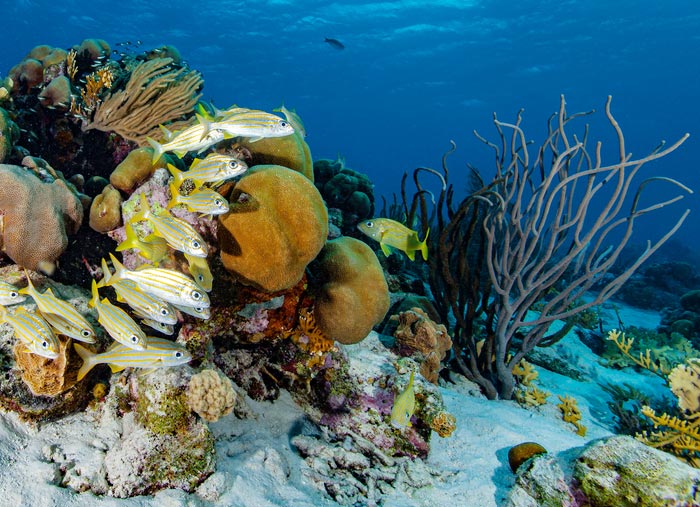Computer modelling aims to inform restoration, conservation of coral reefs

A UBCO researcher has created a modelling program that can help scientists plan for the restoration and conservation of coral reefs impacted by climate change.
Credit: Jean-Philippe Maréchal
UBCO researcher creates hundreds of scenarios, determines importance of coral diversity.
A UBC Okanagan research team has created a computer modelling program to help scientists predict the effect of climate damage and eventual restoration plans on coral reefs around the globe.
This is a critical objective, says Dr. Bruno Carturan, because climate change is killing many coral species and can lead to the collapse of entire coral reef ecosystems. But, because they are so complex, it’s logistically challenging to study the impact of devastation and regeneration of coral reefs.
Real-world experiments are impractical, as researchers would need to manipulate and disrupt large areas of reefs, along with coral colonies and herbivore populations, and then monitor the changes in structure and diversity over many years.
“Needless to say, conducting experiments that will disturb natural coral reefs is unethical and should be avoided, while using big aquariums is simply unfeasible,” says Dr. Carturan, who recently completed his doctoral studies with the Irving K. Barber Faculty of Science. “For these reasons, no such experiments have ever been conducted, which has hindered our capacity to predict coral diversity and the associated resilience of the reefs.”
For his latest research, published recently in Frontiers in Ecology and Evolution, Dr. Carturan used models to create 245 coral communities, each with a unique set of nine species and each occupying a surface of 25 square metres. The model represents coral colonies and different species of algae that grow, compete and reproduce together while also being impacted by climate.
Crucially, he notes, all the key components of the model, including species’ traits such as competitive abilities and growth rates, are informed by pre-existing, real-world data from 800 species.
The research team simulated various scenarios—including strong waves, a cyclone or intense heat—and then measured each model reef’s resilience taking note of damage, recovery time and the quality of the habitat 10 years after the disturbance.
By running so many scenarios with computer modelling, the team found that more diverse communities—those with species having highly dissimilar traits—were most resilient. They were better at recovering from damage and had greater habitat quality 10 years after the disturbances.
“More diverse communities are more likely to have certain species that are very important for resilience,” Dr. Carturan explains. “These species have particular traits—they are morphologically complex, competitive and with a good capacity to recover. When present in a community, these species maintained or even increased the quality of the habitat after the disturbance. Contrastingly, communities without these species were often dominated by harmful algae at the end.”
Coral diversity determines the strength and future health of coral reefs, he adds. Coral species are the foundation of coral reef ecosystems because their colonies form the physical habitat where thousands of fish and crustaceans live. Among those are herbivores, such as parrotfish and surgeonfish, which maintain the coral habitat by eating the algae. Without herbivores, the algae would kill many coral colonies, causing the coral habitat to collapse, destroying its many populations.
“What is unique with our study is that our results apply to most coral communities in the world. By measuring the effect of diversity on resilience in more than 245 different coral communities, the span of diversity likely overlaps the actual coral diversity found in most reefs.”
At the same time, the study provides a framework to successfully manage these ecosystems and help with coral reef restoration by revealing how the resilience of coral communities can be managed by establishing colonies of species with complementary traits.
Looking forward, there are other questions the model can help answer. For instance, the coral species vital for resilience are also the most affected by climate change and might not be able to recover if strong climatic heatwaves become too frequent.
“It is a very real, and sad conclusion that we might one day lose these important species,” Dr. Carturan says. “Our model could be used to experiment and perhaps determine if losing these species can be compensated by some other, more resistant ones, that would prevent the eventual collapse of the reefs.”
Journal: Frontiers in Ecology and Evolution
DOI: 10.3389/fevo.2022.780406
Method of Research: Meta-analysis
Subject of Research: Not applicable
Article Title: Functional Richness and Resilience in Coral Reef Communities
Article Publication Date: 2-Jun-2022
Media Contact
Patty Wellborn
University of British Columbia Okanagan campus
patty.wellborn@ubc.ca
Cell: 250-317-0293
All latest news from the category: Ecology, The Environment and Conservation
This complex theme deals primarily with interactions between organisms and the environmental factors that impact them, but to a greater extent between individual inanimate environmental factors.
innovations-report offers informative reports and articles on topics such as climate protection, landscape conservation, ecological systems, wildlife and nature parks and ecosystem efficiency and balance.
Newest articles

Innovative 3D printed scaffolds offer new hope for bone healing
Researchers at the Institute for Bioengineering of Catalonia have developed novel 3D printed PLA-CaP scaffolds that promote blood vessel formation, ensuring better healing and regeneration of bone tissue. Bone is…

The surprising role of gut infection in Alzheimer’s disease
ASU- and Banner Alzheimer’s Institute-led study implicates link between a common virus and the disease, which travels from the gut to the brain and may be a target for antiviral…

Molecular gardening: New enzymes discovered for protein modification pruning
How deubiquitinases USP53 and USP54 cleave long polyubiquitin chains and how the former is linked to liver disease in children. Deubiquitinases (DUBs) are enzymes used by cells to trim protein…



